Most people need a cup of their java or tea to wake to their day. Or after a lunch. Or during their afternoon tea time. Or before bed time. Or when they need to stay up late to catch up a deadline. Some find tea as a source of comfort during an illness, or sadness. Others may find themselves winding down after a cuppa; or a boost of energy after an afternoon slump. Some use tea as an excuse to drink more water as there is a perception that tea has no caffeine or less. Why are you drinking tea?
Every type of tea is a representation of the culture that it birthed from. India with the Chai tea, Japan with the matcha tea, Morocco with mint tea, Chinese with the dark pu’er or Oolong tea, and other countries which probably store the most exquisite teas we are yet to discover. Some studies claimed that different tea reflects our personality. Tea person are more attuned towards comfort. Just imagine having a cup of tea under the blanket when the weather gets chilly with a good book on hand. Coffee people are known to be on the go, just do it, to quote Nike©.
Now, let’s talk serious about tea. How does the type of tea matters? How much does it affect you?
Let’s understand about caffeine first. Caffeine is commonly link to coffee. Caffeine is a stimulant to your nervous system and create alertness, boosting our energy level. It is diuretic, so it can caused frequent urination. Hence, you need to stay hydrated when you consumed drinks with caffeine like coffee and tea. Caffeine itself does not have any nutritional values. According to U.S. Food and Drug Administration, 141 gram of coffee is equivalent to 115 miligram of caffeine. They mentioned that the approved and safest consumption of caffeine by an adult is 400 mg.
Hence, you thought switching to tea would prevent from coming in contact with caffeine. In a way, yes, but do you know that your favourite tea may contain high amount of caffeine? Even tea. Yes, even that favourite English Breakfast tea that you would not miss drink every morning before going to work. The highly-publicised green tea with wonderful benefits, also contains caffeine, though in smaller amount in comparison to coffee. Now, it is depending the type of tea you consume.
No doubt we should not dismiss the benefits of caffeine as it keeps you sharp when you are in the slump and improve memory in the long run, however caffeine is still an abused substance that we tend to misunderstand. It is recommended that we should limit our caffeine consumption to five cups of caffeinated tea per day. Our body can tolerate caffeine, but when consume in a huge amount, it will make our body nauseous. Signs that you are overdose on caffeine are anxiety, irritability, tremors on the hands, heartburn, upset stomach, irregular heart rhythms, osteoporosis, and increase in blood pressure. And this is more prevalent if you decided to quit caffeine cold turkey, as some may take two weeks for the symptoms like headache and sudden crash of energy to disappear.
As you are reading this, you are probably looking down now to your tea and wondered if your tea has caffeine? Chances are it might have, if you are drinking a black tea or the green tea range. What can you do? Check the labels and read the ingredients! The most accepted amount of caffeine in tea is half of the amount in the coffee. How the tea is steep also contributes to the amount of caffeine. The longer you steep the tea in the hot water, more caffeine is released into the water.
Do you know that caffeine free teas are sold widely?
You can look out for ‘caffeine-free’ label on the packaging or check the list of ingredients. However, do not be fooled by decaffeinated tea! It still has small content of caffeine, the methods of processing the tea leaves stripped away the minerals contained in the tea. There are few methods of processing decaffeinated tea, which not just removing the minerals, but can be harmful at times. The first method is soaking the tea leaves in methylene chloride to remove the caffeine before soaking in water. This method is banned in some countries even though it is the best for flavour retention, as the chemical is commonly used in industrial purpose like paint stripping and metal cleaning.
Second method is processing the tea leaves using Ethyl Acetate, as this chemical is naturally found in tea. However, the chemical is difficult to be remove after processing it, thus consumers complain of ‘tasting chemical’ in their tea. Carbon dioxide decaffeination is the safest process by putting the leaves in a pressure cooker and the gas will remove the caffeine from the tea leaves. Still, it may not be extracted completely, thus, there are still traces of caffeine. And the last method is water processing, which a popular method, by soaking the tea leaves into hot water for a long time, and the water is send to carbon filter to remove the caffeine. The water then is send back to the leaves to re-absorb its flavour.
Caffeine free can come in form of herbal tea and flower tea. Example of herbal teas are like Rooibos, Chamomile, and Cinnamon. Rooibos tea is a red tea and its leaves can be found in South Africa. Due to fermentation, it turns into red. While it is caffeine free, it also has low tannin which will prevent absorption of nutrients consumed. It has antioxidant ability to reduce the risk of cancer and improves bone health. The tea also contains quercetin which aids in stomach cramps and indigestion.
Chamomile tea is made from dried chamomile flowers. It is known to assist in achieving better sleep quality as it contains an antioxidant called apigenin to reduce your anxiety. Not only that, it aids in indigestion and menstrual cramp. Another benefit of chamomile is that it reduces inflammation, which is our body’s response when an infection occurs, which includes anxiety. In fact, it is a common ingredient in beauty products like lotion for sensitive skin. Chamomile has the tendency to comfort and relieve the drinker.
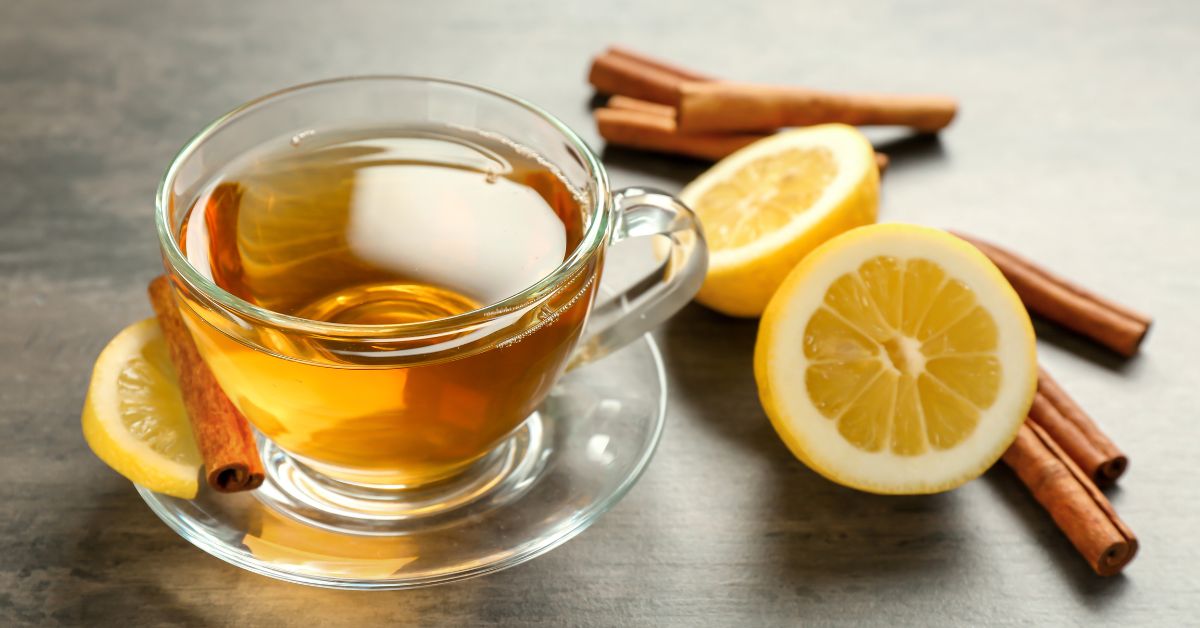
Cinnamon tea has a tinge of spiciness. Some drinkers prefer to add honey to enhance its flavour. According to a study published in “Annals of Family Medicine” on September 2013, Cinnamon tea has been found to reduce LDL cholesterol and triglycerides, known as the bad cholesterol. Not only that, it brings down blood sugar level. However, one must be cautious when purchasing cinnamon as there is a cheap variety called cassia as it is known to cause liver damage. The variety that one should get is Ceylon cinnamon which is a reputable quality.
Not a fan of any of the herbal tea above? Then look no further to local brand, Rhymba Hills®, a 100% Malaysian brand which supplies a range of herbal infusion to help you with different symptoms you have. With names like Lemongrass Blend, Reelax, Reevitalise, Reefresh, you would be tempted to stop working and have a tea time break to enjoy a cuppa. Using the locally sourced, natural herbs found in plantations in northern Peninsular Malaysia, Rhymba Hills® tea range is able to function as effectively as other teas mentioned above. Good news, it is caffeine free!
With the Lemongrass Blend, a whiff of the fragrant lemongrass itself shall transports you to spa-like tranquillity, easing you of insomnia and indigestion. The Reefresh tea shall relief you from the weariness of the world and lift up your spirit on a gloomy day. Reevitalise tea uses quality ginger from Bentong, with its mild spiciness to get you through a chilly day and menstrual cramps. Speaking of sickness, Reelax is recommended for coughs and fever as it contains lemongrass and pandan, as pandan is anti-inflammatory properties and a pain relief. The tea has a common ingredient which is lemongrass, and it is versatile in terms of treating different symptoms as it contains antioxidants.
Still sick? Try AntyOxy, a strong combination of Lemongrass, Kaffir Lime Leaves, Roselle, Ceylon Cinnamon, Tumeric, to fight against tough viruses in your body. Not only that, it promotes good oral health and scalp health.
Seeing too many options and not knowing which to get for yourself or loved ones? Then, get the Sampler Pack that comes with two teabags for each flavour to figure out what you like. It comes with Lemongrass Blend, Java Tea Blend, Reevitalise, Reefresh, Reelax. Another variety of blend you can choose is Exquisite Blend contains variety like Reevitalise, Ceylon Cinnamon Blend, Lemongrass Blend Tea, AntyOxy and Java Tea Blend. Rhymba Hills® also has something for those on the go and environmental-friendly, like the rice husk flask and double wall glass mug, both are great for insulation in keeping your tea warm.
Enjoy life, caffeine free!
Here are the quick links to Rhymba Hills Products:
Rhymba Hills Botanical Infusion x Jadi Batek Clutch Pouch (Visit Malaysia Year 2026)
GiftsRM65.00Original price was: RM65.00.RM60.00Current price is: RM60.00.Rated 0 out of 5Chinese New Year 2026 Money Pouch Set A
GiftsRM95.00Original price was: RM95.00.RM88.00Current price is: RM88.00.Rated 0 out of 5Chinese New Year 2026 Money Pouch Set B
GiftsRM135.00Original price was: RM135.00.RM128.00Current price is: RM128.00.Rated 0 out of 5Christmas Box 2025
GiftsRM120.00Original price was: RM120.00.RM99.00Current price is: RM99.00.Rated 0 out of 5
References:
Caffeine in the diet, https://medlineplus.gov/ency/article/002445.htm
The Effects of Caffeine on Your Body, https://www.healthline.com/health/caffeine-effects-on-body#1
Learn the Types of Teas Without Caffeine, http://www.teagalaxy.com/tea-basics/teas-without-caffeine/
https://www.medicalnewstoday.com/articles/271707.php
How is tea decaffeinated, 28 January 2017, https://www.premiumteas.ca/blog/how-is-tea-decaffeinated/

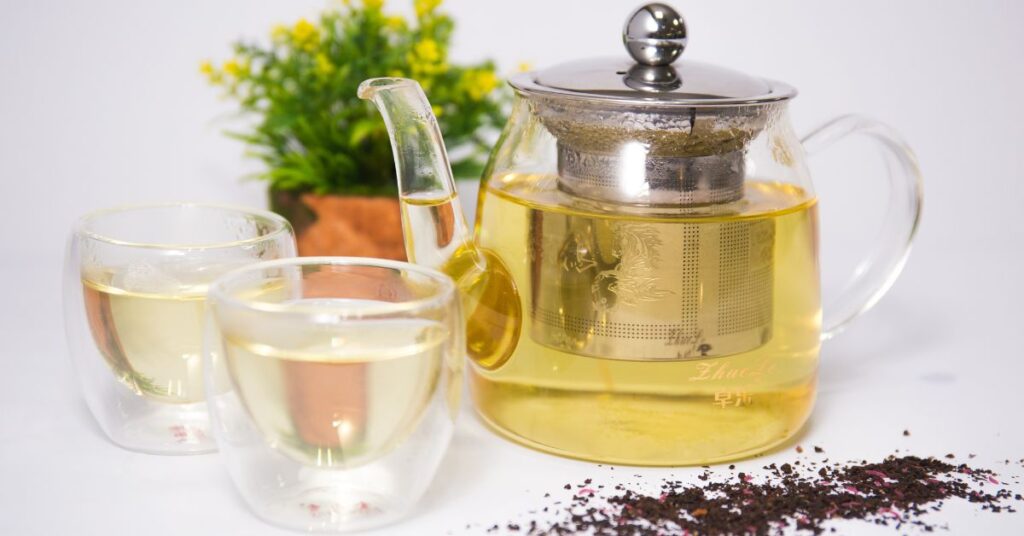
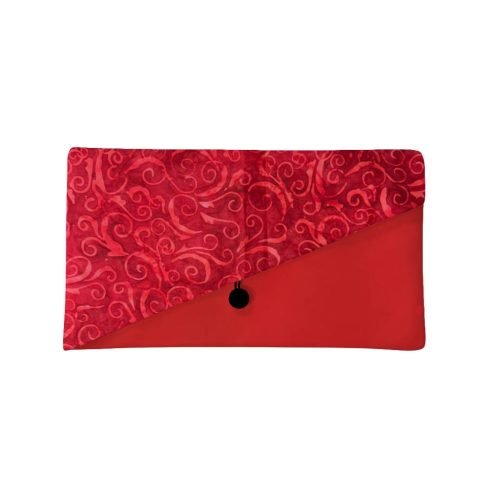
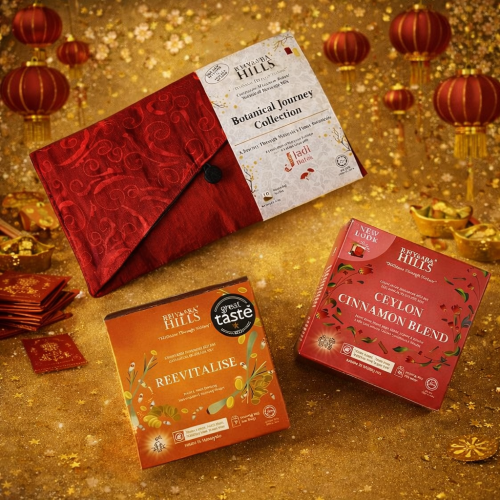
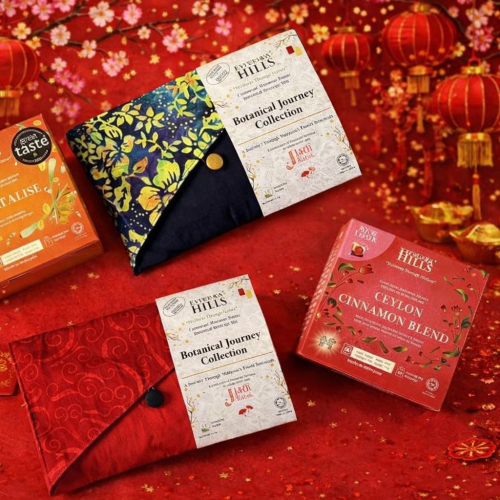
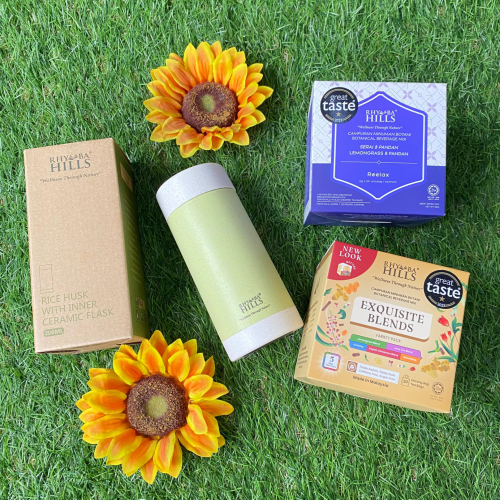



goooooooooooood
Ginger has caffeine so your tea is not caffeine free!